Every now and then on the Internet or on TV screens there are news about children who are not like everyone else. As soon as they get out of their children's cradle, they begin to amaze those around them with their extraordinary talents. At the age of 4, they are already fluently reading books in different languages, and at 6, as if playing, they make a scientific discovery, to which great gray minds have not reached for many hundreds of years. At 11, they go to college, get Nobel Prizes and awards. The whole world is talking about them, they are geeks, children with unique features.
Amazing - close by
Humanity is constantly in search of the unknown. We are looking for extraterrestrial intelligence on distant planets, in the expectation that he will share with us the innermost secrets and help us make the greatest discoveries. But how do we behave when that same, superior to the usual average, mind, mind suddenly appears before us in the guise of ourselves? What do we know about mystery children? Perhaps, only that geeks are by nature. The level of intellectual development in such babies is much higher than the level of their peers. This allows them to develop rapidly and already at a young age to make a lot of discoveries or reach certain heights. Famous child prodigies are the heritage of the nation. But few adults are able to admit that not only can we not explain the phenomenon of the birth of such babies, but we do not even know how to properly communicate with such miracle children.
They are
For some reason, we often hear that geeks appear in England, China, India or any other country. Children with high IQs become professors at a young age and challenge Einstein's theory, play the violin and search for a cure for cancer, build nuclear reactors and mentally multiply six-digit numbers. But for some reason, we rarely read and learn that geeks appear on the territory of the post-Soviet space. Children with "non-childish minds" are not born with us? Not at all, just for some reason they are not talked about much.
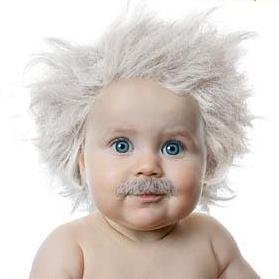
Geniuses from the cradle
They are not often talked about today, but according to statistics, there are gifted children in every school and in almost every class. Officially, there is an opinion that information about them is not made public only because excessive attention from the press and the masses can negatively affect the child's psyche. Whether this is true or not, one can only guess. One of the factors of influence can be attributed to the fact that such children, after leaving school or even before that, leave to receive education in other countries. Of course, there are child prodigies in Russia, examples are known to many. It is quite possible to get information about them, but it would be much better if they were given due attention in the media news.

Young talents
Each child prodigy manifests itself at a different stage of life. Someone begins to "act", being quite a crumb, and someone in an older, school age. Each of them has their own preferences, some write poetry, while others work in a scientific laboratory. There are still child prodigies in Russia today, the examples below will introduce us to them more closely.

Nika Turbina
Perhaps one of the most famous Soviet geeks is Nika Turbina. This is a poetess girl, her first book "Draft" was translated into 12 languages and had a circulation of 30,000 copies. They learned about her all over the world, at that time Nika was only 9 years old. She played roles in films, and after that the film "Nika Turbina: The Story of Flight" was shot about her.
Andrey Khlopin
At the age of 10 BUT Andrey explained how “silver clouds” appear, and this remained a mystery to scientists for many years. For his hypothesis, a boy from Krasnodar was listed in the Guinness Book of Records. Another example of the fact that there are child prodigies in Russia.
Afanasy Prokhorov
Theater artist, dancer, pianist and singer, and he is only 12 years old! Performs classical works in 6 languages, repeatedly won first places at international competitions, performs at charity concerts. The boy is originally from Moscow, but in 2007 he left for America, and today he is already gaining recognition there.
Dasha Baldenkova
She is only 18, and she is already working in a scientific and educational laboratory at the Center for Applied Nanoelectronics. Daria is a multiple winner of competitions and olympiads. She won two semi-finals of the main world competition of school students "Intel ISEF". It should be noted that many of the Nobel Prize winners have already come out of its finalists.

Here are just a few stories about what child prodigies are doing and working on. Examples, of course, can be given very different, there are many.
They made history
Few people know that many famous Russian people were geniuses from birth. Someone was able to prove himself and went down in history, some were forgotten after a while, while others simply remained unrecognized. Child prodigies in Russia have been born since ancient times, but this is how they began to be called relatively recently. These are Pushkin and Griboyedov, Lermontov and Peter I, and also Boris Godunov and Tyutchev, Chukovsky, Gogol, Blok and many dozens of others.

Most clever man who ever lived on our planet - William James Sidis. His IQ reached about 300 units, while intelligence fluctuates from 80 to 100. He was born in 1921 in the USA, in the family of Boris Sidis, a Jewish immigrant from Ukraine. He got this unusual name in honor of the American philosopher, who later became godfather boy. William knew more than 40 languages (according to unofficial data, about 200), graduated with honors from Harvard at the age of 16, at the age of eight he was the author of 4 books, and learned to write before he was 1 year old. He studied psychology, history and science about the evolution and development of the Universe, wrote scientific treatises that are only today recognized by science. What is most interesting, he worked as a simple accountant in a small office and was terribly afraid that someone would find out about his "talent".
After
Of the most different corners planets, news is heard that child prodigies are appearing. examples of their lives and incredible abilities, most likely, are preparing us for the fact that humanity will soon switch to a radically new level of its development. What this will lead to and what our life will be like in a couple of hundred years, one can only fantasize.
At all times there were children who were very different from the bulk of their peers. They still amaze the minds of the inhabitants and the scientific world. They are admired, admired, envied. But is it really good to be a child prodigy? And who is destined to be?
There was even a special science that studies the phenomenon of geeks - eugenics. Its founders believed that genes were responsible for whether gifted children would be child prodigies. And in order to give birth to a child prodigy, both parents must have ideal genetic heredity, that is, they must not have alcoholics, thieves, or other antisocial personalities in their family.
In fact, it turned out that the genes have nothing to do with it. The reason why children become geeks lies in the violation of the balance of hormone levels in a child. Thereby nervous system such children mature much earlier than their peers. And accordingly, the development of various skills is at an accelerated pace. Mainly in mental development geeks are ahead of their peers.
In the last decade, more and more little geeks are being born. But it is not at all necessary that all geeks will later become geniuses. Only units. Such as Beethoven and Chopin, Pushkin and Lermontov.
Now many parents are wondering how to give birth, raise and raise a child prodigy. Adults tend to see giftedness in their child. And to help them, various schools are opening everywhere. early development, in them children are taught various wisdoms of life, foreign languages literally from the cradle. Some even try to teach how to become a child prodigy.
Problems of child prodigies
Children who have been recognized as child prodigies arouse great interest and increased attention from the public. Reports about little geeks appear in the media every now and then.
Undoubtedly, if your kid has any talent, it needs to be developed, but not at all in order to make a child prodigy out of your child. Because by instilling in a child from childhood that he is special, you are doing him a disservice.
Think about whether you want your baby to have happy childhood? After all, parents who are not just engaged in the development of their child, but fanatically realize their ambitions, deprive the baby of simple childhood joys. The child is constantly under enormous pressure from adults. The requirements for it are very high. And if a child ceases to live up to his parents' expectations, this can become a great psychological trauma for him.
When a little child prodigy grows up, it often turns out that no one needs his talent and is no longer interesting. After all, adults who were considered child prodigies in childhood cease to be them, because they practically become equal in their abilities with the rest. Only small children with the abilities of adults cause tenderness, and when they grow up, the interest of others in their person disappears, and they are forgotten.
But former child prodigy, who has been in the spotlight all his life, cannot accept this. 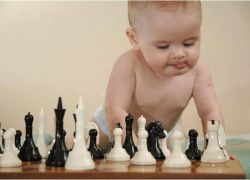 He turns out to be unprepared for the life of an ordinary average person in society. This is where the psychological problems begin.
He turns out to be unprepared for the life of an ordinary average person in society. This is where the psychological problems begin.
The same media never talk about how long geeks live. And 50% of them do not live long. Someone commits suicide, unable to bear oblivion, someone ends his life in a hospital bed in a psychiatric hospital. And very few manage to adapt to ordinary life, start a family, children.
Do not try to raise a miracle child from your baby. Love him the way he is. May it grow with your efforts developed child, and this will help him in the future, in adult life.
 The appearance of a child in the family is a miracle, and the appearance of a “miracle child”, so literally with German language translated as a child prodigy, - this is not just a whim of fate, but a real test. Parents will always be amazed and delighted by the unusual abilities of their children. However, despite the fact that the developmental progress that a child makes in the first years of life makes parents proud of their unique child, at the same time, most of them have a reasonable concern: what to do next with this “miracle”? It is difficult for adults who are not burdened with a load of genius, and who have experience in classical education, to find the right approach to an extraordinary child. Let's try to understand this difficult matter by answering next questions: “How to recognize a genius in a child?”, And “What mistakes to avoid in raising an extraordinary baby?”
The appearance of a child in the family is a miracle, and the appearance of a “miracle child”, so literally with German language translated as a child prodigy, - this is not just a whim of fate, but a real test. Parents will always be amazed and delighted by the unusual abilities of their children. However, despite the fact that the developmental progress that a child makes in the first years of life makes parents proud of their unique child, at the same time, most of them have a reasonable concern: what to do next with this “miracle”? It is difficult for adults who are not burdened with a load of genius, and who have experience in classical education, to find the right approach to an extraordinary child. Let's try to understand this difficult matter by answering next questions: “How to recognize a genius in a child?”, And “What mistakes to avoid in raising an extraordinary baby?”
Symptoms of genius
Despite the fact that science has gone far ahead, today, however, genius is shrouded in a halo of mystery and suspense. It is quite difficult to formulate the criteria for a “miracle” when you look at a painting, listen to a piece of music and understand that this is extraordinary. Genius demands recognition.
To date, all the geniuses who have ever lived are known. Therefore, we can calculate that a recognized genius is born one in 50 million people, and how many of them are not recognized? Although even here geneticists gave the exact answer: potential geniuses are born one in 100 thousand people. And this does not depend on the country, continent, place of birth - every 100,000 babies, according to the Hardy-Weinberg genetics law, are a natural genius. Where do these unusual children go? And how to consider the gift of genius, and most importantly - not to kill it? Genius has its own physiological prerequisites. To date, they are described in most detail by the Soviet geneticist V.P. Efroimson in the book "Genetics and Genius" and here are some of them:
- 1. Highbrow. Yes, exactly, the larger the forehead, the smarter the person.
- 2. Hyperuricemia. Elevated levels of uric acid in the blood, which chemical properties similar to caffeine or theobromine - stimulants of brain activity. So, a normal person, in order to cheer up, drinks a cup of coffee or strong tea, and receives a charge of physical and mental activity, while a genius is in a similar state all the time.
- 3. Marfan's syndrome. Often, these are people of high stature, thin, with elongated limbs. As a rule, they have a heart disease and are characterized by an increased content of adrenaline in the blood - the most powerful source of vital activity.
- 4. Cyclothymia. A mental disorder characterized by sudden mood swings from depression and blues (hypothymia) to high spirits, bordering on euphoria, and a desire to do good (hyperthymia). It is in the phase of hyperthymia that geniuses, most often, create their unique works.
- 5. Morris syndrome. This pathology is manifested by a violation of sexual development.
Of course, the relationship of these genetic features with genius will not always be one hundred percent, however, the presence of one or two signs is most likely. Along with genetic prerequisites, there are other characteristic signs of genius.
Jonathan Swift said: “When a true genius is born in the world, you can accurately distinguish him by next sign vP‚ "all the idiots unite against him." Indeed, geeks are very different from their peers, so they are often rejected by them. And the little geniuses themselves are not interested in the society of the same age, they look smarter and more capable, which irritates their peers and gives rise to ridicule Therefore, one of the signs of a child's eccentricity is his desire to communicate with adults, ask questions and receive comprehensive answers, avoiding childish amusements and communication with children.
Geeks from infancy are distinguished by curiosity and a good memory. And there are many examples of this: for example, an eleven-year-old Egyptian boy, Syed Mustafa Sherif, learned all the suras of the Koran in six months, while an ordinary student of a religious school would need 8 years for this. And there are many such examples. Genius children have a wide range of interests, from how life appeared on Earth to the "stuffing" of a computer and TV. Therefore, parents should be patient and increase their personal level of knowledge. And in general, you have to come to terms with the idea that your child is smarter than you. And you will have a daily intellectual duel with your equal. Therefore, let the child lead you, he knows what he is interested in. The task of parents is to listen and help find answers to the questions of interest to the little know-it-all.
Gifted children are distinguished by enviable determination and the ability to do several things at the same time. So, creating his masterpiece, the child will redo it as many times as necessary to achieve, in his opinion, perfection. At the same time, he can talk, play, without being distracted from the main lesson. This feature is called the "Caesar Phenomenon".
The craving for mental work, the need for increased intellectual effort, is another feature of geeks. A child - a genius suffers without mental labor, and his natural industriousness becomes the basis for expanding his horizons. The ability to focus for a long time on one task is an internal need, which is generally characterized as a tendency to intellectual activity. It was this quality of giftedness that Edison had in mind when he said, "Genius is 1% inspiration and 99% perspiration."
Most gifted children have a bright start, however, according to scientists, only 3-5% of them achieve success and recognition of their genius in the future. Where does the remaining 95% go? And they, in one case, in adolescence compared in development with their peers, and in the future they will have a normal life, and in another - their fate is quite tragic. Being unrecognized, not knowing how to lose and make mistakes, unrealized geniuses often end up in psychiatric clinics, drinking too much and locking themselves in their "shell".
How not to harm, but to help develop the unique abilities of the child?
What is the phenomenon of the disappearance of little geeks? Scientists believe that the reason for this is both the internal psychosomatic organization of the child himself and the mistakes of parents in raising little geniuses.
Thus, a child who is accustomed to solving tasks with ease, when faced with difficulties in adult life, does not know how to overcome them. Most geniuses are characterized by everyday and social infantilism, which makes them helpless and confused in the ocean of everyday problems. Often they cannot find a common language with other people and forever remain alone and isolated from society, which makes their existence unbearable. In addition, such children also suffer from various somatic diseases, nature, endowing with remarkable intelligence and abilities, takes away the physical component. To all of the above, it is worth adding the mistakes of parents in education, and for most they are similar:
- Bet on the development of unique data, not paying attention to the development of other abilities. It is not known whether a young genius chess player will grow into a second Garry Kasparov, but knowledge of languages, books read, listened to musical works will be irretrievably lost.
- Concentrate on intellectual development to the detriment of physical fitness. Nature, endowing the child with a remarkable mind, does not at all give him a chance to love physical exercises and sports. And the more difficult physical activity is given to a child, the more efforts parents should make to instill a child's love for sports.
- Isolate the little genius from peers. This is a real problem: on the one hand, the child himself does not want to be in a society of the same age, he is not interested in peers, on the other hand, psychologists do not recommend placing him in a group of older children. According to experts, older children will reject the little genius, despite the fact that he will solve intellectual problems on an equal basis with them. The only correct decision is that the child should remain in an environment of his own kind, while training should take place according to an individual program, or in a school for gifted children.
- Excessive guardianship of a young talent. Some parents are so focused on developing the talent of a little child prodigy that they completely forget to instill in him elementary household skills. So, there are cases when a child of 7 years old, who wrote amazing poems and was fluent in typing on a computer, was fed from a spoon, just because he did not know how to use this cutlery. And the young geniuses who, even as teenagers, don't know how to tie their shoelaces? ...
- Desire: at any cost to glorify the little child prodigy, and at the same time himself. It all starts with a harmless demonstration of a miracle child to neighbors and colleagues, and ends with filming on television and touring the country. Such, in fact, harmless glory can lead both to the "star disease" of an unformed personality, and to prolonged depression, once an unclaimed talent.
However, no matter how the fate of the little genius develops, and the ability to think extraordinary and solve non-standard tasks has not prevented a single person. And these abilities need to be developed.
Good afternoon dear friends!
Geeks are a fashionable word today. The development of abilities in children with early age many schools of early development, giftedness are engaged in, a lot of time is devoted to creativity at school. However, geeks are not just called children with slightly above average abilities.
We are talking about brilliant children who already at the age of 3-4 think like university professors. And today, dear readers, we will consider interesting information about child prodigies.
Who are these geeks? A child immediately appears in the imagination, in preschool age doing calculations of ten-digit numbers in his mind, playing on musical instruments etc. To some extent, this understanding is correct.
If we turn to the meaning, and originally embedded in the German word "wunderkind", then we get the translation "wonderful child." Every second person could be classified as such.
In the process of its use, the word acquired a new meaning - a child with unusual intellectual and creative abilities, which are akin to genius. Most often, geeks are found in the field of mathematics, physics, chemistry or music.
The degree of giftedness in all children is different. Genius occurs in one child in 3 million. High talent in any one or related fields of knowledge is more often manifested.
There are three types of geeks:
- gifted;
- carriers of talent;
- savants.
Gifted children immediately stand out among their peers. They have high intelligence, show early Creative skills at a high level.

Geniuses have a pronounced talent in any one area, for example, like Mozart in music. At the same time, it is vital for them to express their talent: they treat this as their main purpose in life.
For geeks-savants, the situation is expressed in a completely different way. They may show limited intellectual ability, look retarded next to the bulk of children, but have a bright talent in one area, have a phenomenal memory and some kind of keen sense, for example, a sense of time.
Savants are often compared to autistic people. Indeed, they have many common behavioral traits, but savants are not a disease, but a form of manifestation of talent and personality.
Where do these children come from? Most often, the reason lies in the genetic plexus. But sometimes geniuses are born in ordinary families, where, by chance, suitable conditions for development are created for them.
Could Mozart have achieved such success if not for his father, a musician, who considered his son's talent in time? In order for genius to mature, appropriate conditions are necessary.
The Gifted Brain: Are There Any Differences?

Scientists who became interested in the phenomenon of child prodigies became interested in how the brain of such people works. Are there any differences from people with average abilities?
In 2012, an experiment was conducted for which 8 phenomenal personalities were selected different ages. The names of the test subjects who participated in the experiment were not disclosed. Most of them had unique abilities in music and mathematics.
As a result of experimental experiments, scientists managed to find out that these people had an amazing working memory. It allowed not only to memorize long combinations of numbers, but also to make calculations with them.
Another feature is the high intelligence that most of the participants showed as a result of testing.
Also, scientists have established another oddity: child prodigies are very close to autists with their increased attention to detail. At the same time, nature saved them from the negative manifestations of this disease, and the resulting features only sharpened their talents.
However, researchers became interested in questions of genius long before the named date. In 1891, the Italian physician Cesare Lombroso published The Man of Brilliance, and even earlier, in 1869, the work of Charles Darwin's cousin Francis Galton, Hereditary Genius, was presented.

In it, based on the study of genetics 20 brilliant artists and musicians, it was confirmed that genius is transmitted genetically. This conclusion is confirmed today.
However, genes are not the only component of genius. Even in antiquity, the idea was born of the relationship of genius and madness, in other words, mental illness. So the proximity of geeks and autists is by no means accidental.
Modern level technical equipment made it possible to trace how the brain of a genius works during the moments of work with information and rest. MRI data were used for the experiment. It turned out that during the rest, the child prodigy's brain works much faster and more productively.
And now let's remember that the periodic table appeared to its author in a dream. Many poets have written about the unconsciousness of creativity. Remember at least "Monument" by A.S. Pushkin, where he appeals to the muse!
But earlier conclusions about high IQ in gifted people were not so unambiguous. Among them there could be people with a high level of intelligence according to the test, but not always.
This fact is easy to follow from the biographies of brilliant people. A. Pushkin was simply expelled from mathematics lessons, Einstein did not know this subject well at school, and Tsiolkovsky was expelled from the institute.
On the contrary, it was easier for people with high IQ to settle down in society, to arrange their personal lives, i.e. live like a normal average person. So an IQ test is not an indicator!

But non-standard thinking is present in all geniuses. When solving a problem, they do not follow already established algorithms, but develop their own ideas, sometimes ridiculous.
All of these traits add up to genius. But the most interesting thing is different: scientists have studied crazy people and established neural connections in their brains similar to those that geniuses had. So genius and madness really stand side by side!
The fate of geeks: problems of socialization
Modern newspapers often publish articles about child prodigies, about what they can, what they show unusual abilities. As a rule, such notes appear when the press only discovers the child, and his fate has not yet been decided.
Alas, the subsequent fate of such children in most cases is tragic. Lack of understanding among peers, difficulties with socialization and personal life, mental and emotional stress, disappointment lead to mental or physical illness. Rarely, when circumstances develop successfully, and the child finds adequate teachers and continues to move forward.
The examples of the fate of many brilliant children are pitiful: they could not cope with social exclusion, fell into depression and mental illness. The worst outcome was suicide.
Here are some famous child prodigies:
- Akrit Yaswal. A boy from India who had his first surgery at the age of 7. Today he has a master's degree in applied chemistry and is engaged in the search for cures for cancer.
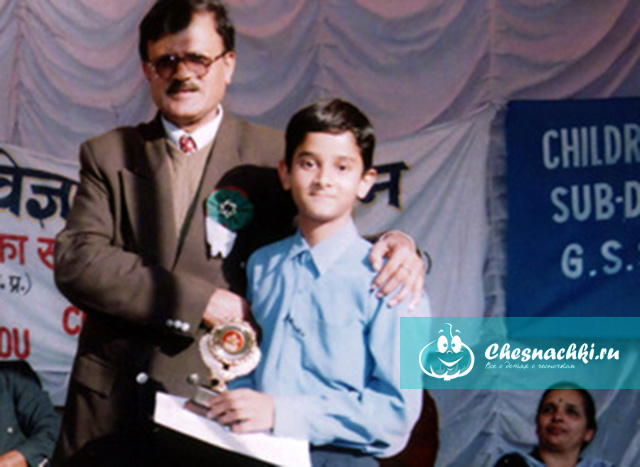
- Cameron Thompson. A young mathematician from Wales, one of the mathematical geniuses in the world. Today his path is complicated by Asperger's disease - specific form autism.
- Jacob Barnett. American mathematician who became a student at the University of Indianapolis at the age of 10. He is currently working on his dissertation in the field of quantum physics.

- Pavel Konoplev. At the age of 16 he entered the university, at the age of 18 - in graduate school. After that, he suffered a severe mental illness.
Today, children-geniuses began to pay more attention. Separate training programs are being created for them, and work is underway with psychologists on their socialization. In the United States and Japan, such programs have existed for a long time: they realized that the brain is the greatest value of the nation.
In Russia, this direction is just beginning to develop. Programs for gifted children are being developed, awards and scholarships are being given out, TV shows are being held where such children have the opportunity to show themselves.
Incredible Facts
Many of us strive to achieve excellence in our field.
Some manage to reach the peak of their careers in adulthood, however, there are such talented "copies" that already in childhood superior in skill to many adults.
Throughout history, there have been a large number of geeks.
Below is a list of today's talented children who have proven themselves in various fields.
10. Mikaela Fudolig

Born in 1991.
Michaela entered a university in the Philippines at the age of 11. At the age of 16, she graduated with honors and became the owner of a red diploma in physics. Just at that time, her peers were graduating from a comprehensive school.
Currently, the girl is a graduate student and professor at your home university, she teaches econophysics, mathematical modeling of behavior in systems and biological systems.
9 Akrit Pran Jaswal
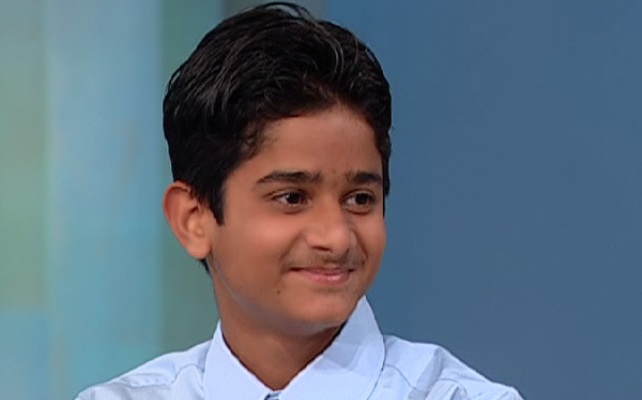
Born in 1993.
This Indian boy became famous after he had his first operation at the age of seven. Even then he was considered a medical genius. He performed the operation on an 8-year-old boy who suffered from a burn.
Then Akrita amputated his fingers. The young talent entered the university at the age of 12, and by the age of 17 he was already working on obtaining a master's degree in applied chemistry. Today he is busy searching for a cure for cancer.
8. Taylor Wilson (Taylor Ramon Wilson)
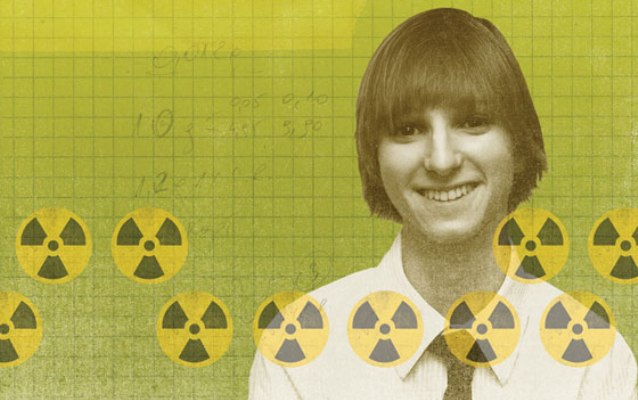
Born in 1994.
Taylor Wilson is the youngest person in the world to have created a working fusor: a device designed to simulate nuclear fusion. He built a bomb at the age of 10 and created a fusor when he was barely 14.
In May 2011 the boy won international competition Intel International Science and Engineering Fair, presenting its radiation detector.
Today's children develop much faster than their parents.In February 2013, he spoke at the TED 2013 conference, talking about his ideas for creating underground nuclear fission reactors. He has developed a compact nuclear reactor that he says can generate 50 megawatts of electricity and will only need to be refueled once every 30 years.
7. Cameron Thompson
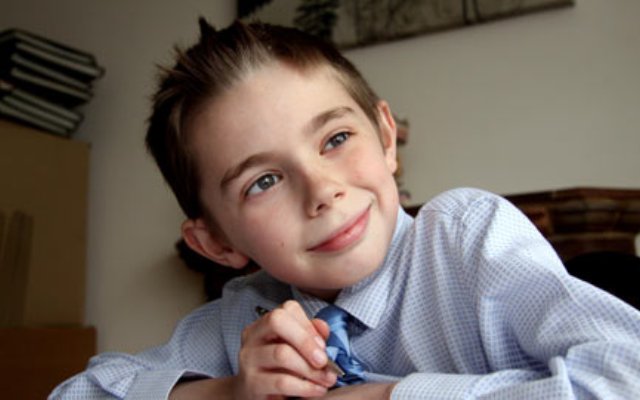
Born in 1997.
Thompson is a "math prodigy" from North Wales. When he was four years old, he corrected his teacher who said that zero is the smallest number. Cameron then added that she forgot about negative numbers.
He began studying advanced mathematics at the university at the age of 11. At the same age, he passed two final exams in mathematics and higher mathematics. Then it was shown on the BBC in a program about teenage geniuses.
He has difficulty learning other subjects due to asperger's syndrome, but, undoubtedly, Cameron is a living embodiment of a mathematical genius.
6. Jacob Barnett

Born in 1999.
Jacob is an American mathematician. When the boy was two years old, he was diagnosed with a severe form of autism. Doctors said that the boy might not learn to talk, read, perform the simplest daily activities, and even that he might develop difficulty in self-care.
However, things did not go as the doctors predicted. A year later, the boy was already reciting the alphabet in forward and reverse order. Moreover, at the age of three, during a visit to the planetarium, Jacob told the guide about why moons of mars such a strange shape.
At the age of 10, he entered the University of Peru in Indianapolis (Indiana University-Purdue University Indianapolis). While working on his PhD, he claimed that one day he would be able to disprove Einstein's theory of relativity.
He is currently busy working on his doctoral dissertation in quantum physics.
5. March Tian Boedihardjo

Born in 1998.
This boy was born in Hong Kong and is the youngest student at the University of Hong Kong, having entered there at the age of 9. He passed with excellent marks in higher mathematics and all the final exams at school.
All children are born scientistsHe participated in a specially designed dual degree program, successfully completing a Bachelor's degree in Mathematical Sciences and concurrently a Master's degree in Philosophy. He is currently working on his doctoral dissertation in mathematics in the United States.
4. Priyanshi Somani
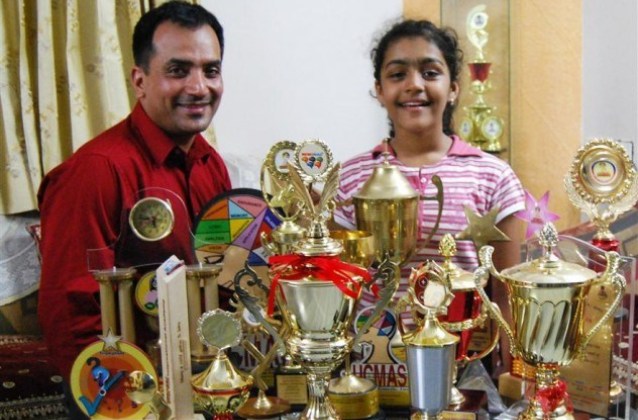
Born in 1998.
This girl is a living calculator from India. She started to practice verbal account at the age of 6, and at 11 in 2010 she already became the youngest participant and winner of the Mental Calculation World Cup.
She managed to bypass 36 competitors from 16 countries. She took first place with Square root out of a 10-digit number in a record 6 minutes 51 seconds.
To top it all off, she was the only contestant to achieve 100% accuracy in addition, multiplication, and square roots in the history of the contest.
In 2012, she became the new world record holder in the same competition, calculating the root of a 10-digit number in 2 minutes and 43 seconds.
3. Akim Camara
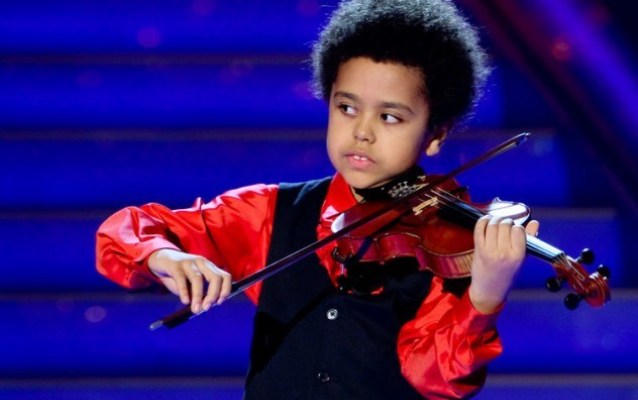
Born in 2000.
Akim Kamara is a violin prodigy from Berlin. He began playing the violin at the age of two, while the boy has an incredible musical memory, because while still in diapers, he hummed the musical compositions he heard.
Soon its natural ear for music was noticed and he, a two-year-old baby, was taught music twice a week. After six months of training, the boy masterfully wielded the violin, and in 2003, at the age of three, he made his debut at a Christmas concert.
2. Ethan Bortnick
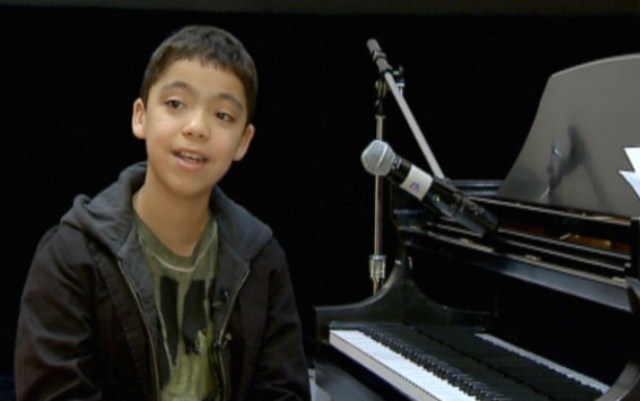
Born in 2000.
Ethan Bortnik is a musician, songwriter and actor. When the boy was three years old, he began to play the keyboard, and at the age of five he was already composing music. His debut performance took place in 2007 on The Tonight Show, after which he repeatedly gave concerts.
His name is in the Guinness Book of Records. There he is listed as the youngest musician giving solo concerts. He is also the youngest headliner to ever play in Las Vegas. He did this at the age of 10.
1. Tanishq Matthew Abraham
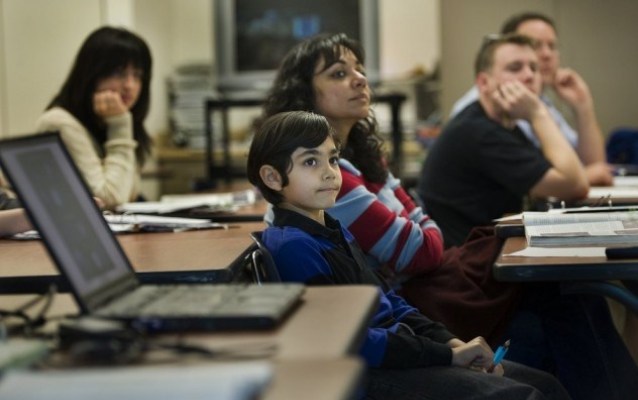
Born in 2003.
Tanish is the youngest member of the organization Mensa which he joined at the age of 4. The boy's genius was already visible when the baby was barely 4 months old, and he began to look through children's books, while correctly answering questions on the text.
After gaining membership in Mensa, he scored a record 99.9 points during an IQ test. At the age of five, he graduated from mathematical courses in educational program Stanford University for Gifted Youth, completing all levels in just six months (training typically lasts from kindergarten up to grade 5).
At the age of six, he is already taking university courses, passing exams almost perfectly, and is the youngest member of the Phi Theta Kappa Honor Society (a prestigious community like Mensa). Since then, he has regularly published essays on the NASA website.
